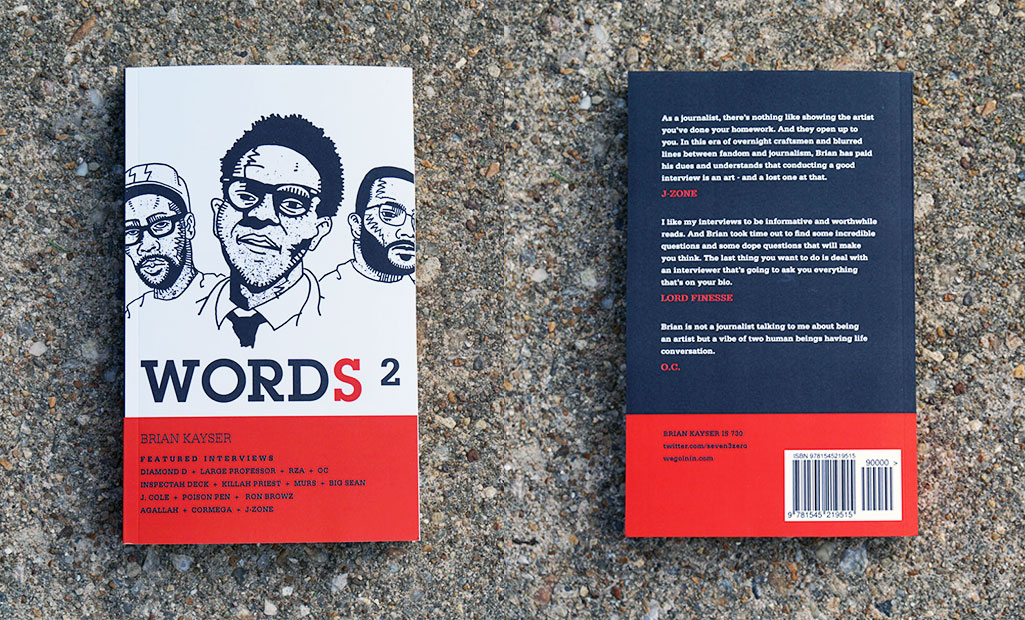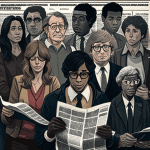Charlottesville hip hop author Brian Kayser has built up quite the name for himself in the community with his books, interviewing some of the greatest players in the hip hop game. The graphic designer / illustrator working with Kayser, and longtime friend of RVA Mag, Jeff Smack, recently sat down with the author to discuss the new release of his second volume of “Words”, a series of collected hip hop interviews with the living legends and MVPS of rap music.
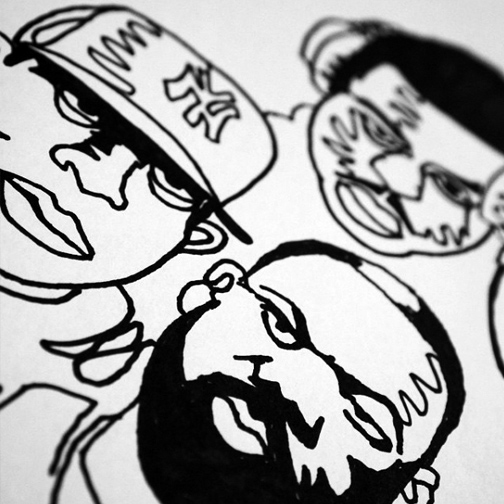

The true interview and article format on a printed page was a beautiful thing for those of us that came up with it. Kayser’s built a body of work through all of that and “Words” is multi-volume series of self-published books compiling his collection of conversations with the most legendary and established artists of the last 25 years.
But it’s not just a book or even a series of books. I see it as a contribution to the future state of hip hop’s cultural archive. Kayser’s taking the work that’s been done documenting these artists over many years and publishing it anew. Making it available to anyone that wants to know. Most art forms are about pushing forward and yet knowing what came before. Especially music as an artform and especially hip hop as a culture.
The work Kayser is doing feeds that process.
Kayser: I think a huge focus of it is trying to get the artists that were off the beaten path, that were legendary and well-respected in the hip-hop community but not easy to find. That was part of the thrill, trying to find artists that didn’t want to do a million interviews and were not really telling their story and had a lot to offer. Smoothe Da Hustler talking about his wife passing and stepping up to be a single dad when he explained his absence in music, something no one knew. It was stories like that that motivated and inspired me to keep hunting for other stories.
Smack: How did you coordinate these artists for the interviews? Did most conversations happen over the phone?
Kayser: Yes. For someone like DJ Premier, I had been trying to get an interview with him for years and his manager would give me the runaround or just not respond. When I finally got him, he was completely surprised that he was hard to get at. Just Blaze, we had tried to coordinate so many times and we’d reschedule. Then one night I got a call where the person said, “I got GZA. Can you do it in fifteen minutes?” I had to rush home, charge the phone, record off of speakerphone, all knowing that I might not get another chance. I didn’t even have questions for GZA yet because I didn’t think it would happen. And then it did.
Smack: I know from being in a magazine office that if an artist gives you time you have to maintain the attention of the artist with good questions. It’s got to be kind of nerve racking but I guess you kind of fall back into your knowledge of the music and your innate awareness of that artist?
Kayser: Exactly. But it’s terrifying because the last thing you want to do is look bad to the people you grew up idolizing. That piece could be really stressful. And sometimes you meet your idols and they’re just not that cool. But they’re people and I think we build them up that they’ll be exactly like they rhyme. But when you love the artist’s work and respect their craft, you don’t want to come off as a fan or someone who didn’t do their homework and can’t hold their attention. Establishing that rapport and showing them that you’ve done your work, they’ll open up so much more. I was just interviewing O.C. and he was telling Big L stories he said he’d never told because I was asking the right questions. Moments like that are really cool but it took me some time to learn that as an interviewer how to bring that out of artists and accepting that it might not happen every time.
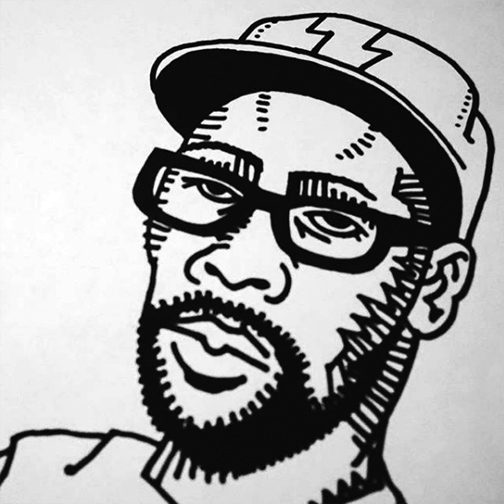

Ruler Zig Zag Zig Allah by Jeff Smack
Smack: I was thinking about the preparation versus conversation but I guess it goes back to relating to these folks as human beings. You know the work and how to fall back in conversation and get those real stories going.
Kayser: Exactly. And my former partner with HipHopGame was a knowledgeable guy so it helped being surrounded by other diehard hip-hop fans because I’d get questions from him too that he’d always wanted to know. I never wanted to have artists end the interview early because they were bored or didn’t see the value in the interview. To have those moments, you really have to spend time with the music and appreciate it.
A lot of it is taking the music seriously and not just listening to see if it bumps and what’s a cool punchline. It’s about understanding how the albums build off each other, the symbolism at play, and all the other elements. Unless you’re someone like Jay-Z or Kendrick, fans don’t really break down lyrics or dig as hard as they could. Some of the lesser known artists really appreciate that and opens up a quality conversation.
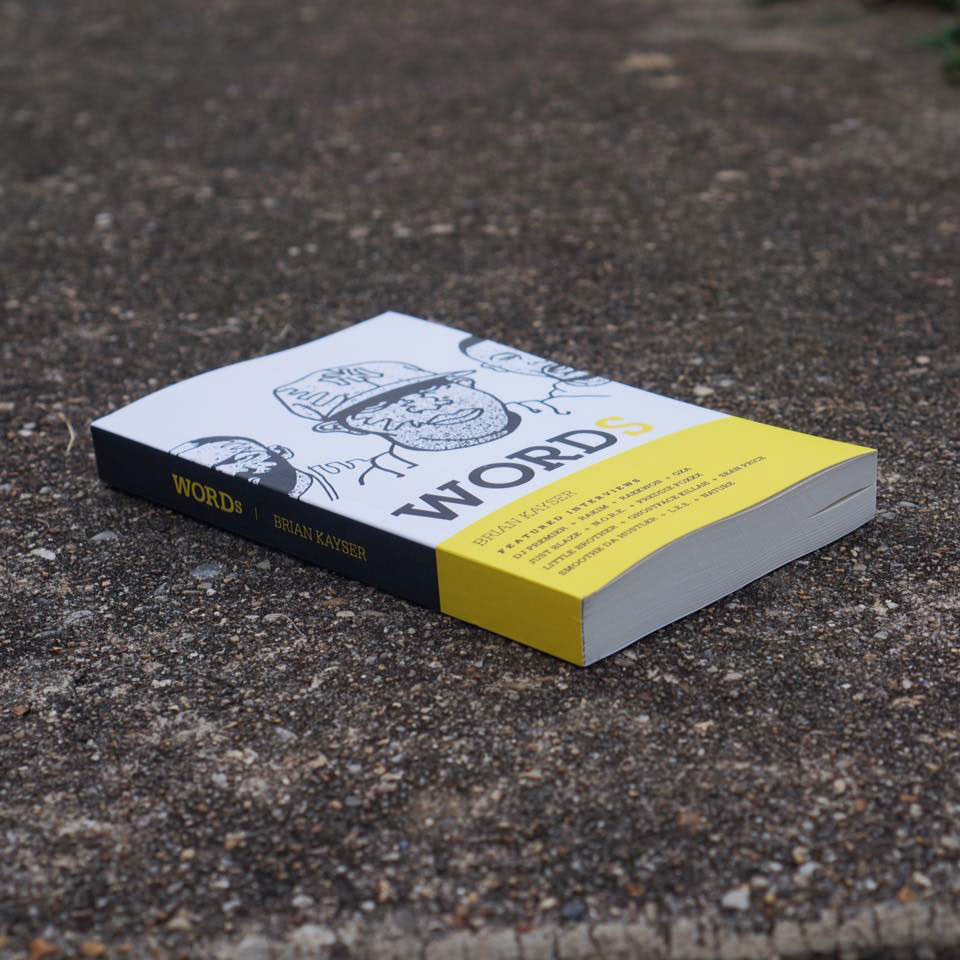

Smack: You’ve done so many interviews. How did you decide who you were going to include in the “Words” projects?
Kayser: Volume One was my all-time favorites where I wanted to come out the gate strong and show why I was doing this. These were stories that needed to be told and I added commentary to the interviews. Some I had to work really hard to get, like DJ Premier. GZA was my first big interview. Before him, I wasn’t pulling big interviews and talking to him made me realize how far interviews could go and if I could do that with GZA, who else would be willing to tell their story. DJ Premier was a huge one because once I got the interview, we talked for over two hours, which I haven’t seen him do. He talked about meeting Nelson Mandela and Guru and so many topics I’d always wanted to know but had never read about. I learned so much more about him than what I already knew.
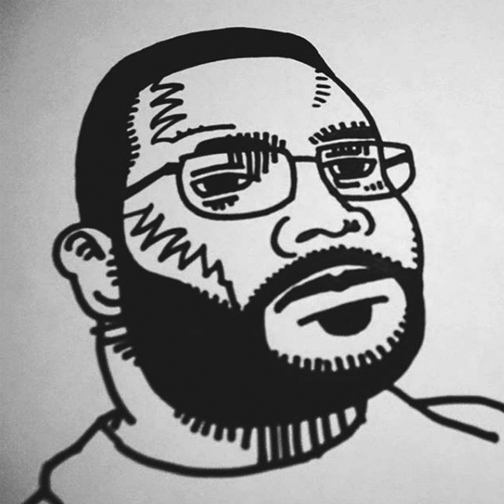

Large Professor by Jeff Smack
Smack: So we got two “Words” volumes and a third one in the works. How long do you want to keep doing them?
Kayser: As long as you want to keep drawing them! I love the artwork that you bring to it and I think it’s a huge selling point. It makes everything look current. My goal is to keep doing interviews and to keep publishing them. At one point I was doing 250 interviews a year and obviously, the quality wasn’t always there, but there’s a lot in the stash. I’m still doing interviews with new artists and veterans. I would love to keep the series going as long as possible because I want it to serve as documentation of the stories not being told. There are so many eras and trends that are not well-documented in hip-hop and while these books can’t do it all, I hope they contribute.
Smack: You mentioned HipHopGame and this audience would be interested to know how long you’ve been in Virginia and what other projects have you worked on?
Kayser: I came to Charlottesville in ‘02 for school, wrote for the Cav Daily, had an editor who took liberties with my writing that I didn’t like so I quit and emailed every hip-hop website I liked. Only one responded, HipHopGame. I stayed in town, kept writing, got my teaching degree, and have been loving that. I’ve had short fiction published in various magazines and journals and just finished a book with one of my favorite MCs, Cormega, on his album The True Meaning. There’s some other books in the works and just building with some other artists. Plus I think me and you have some great stuff in the works.
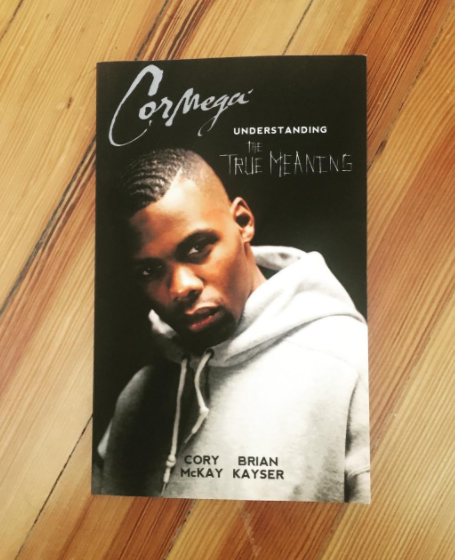

Understanding The True Meaning
Smack: I’m excited about that too, just the ability for two people to say, “Hey, we’re going to do this” and then they did and before you know it, you have a physical product in your hand. That’s a rare thing. And you mentioned the Cormega book that just came out a couple weeks ago.
Kayser: Yeah, that was a really cool project. To celebrate his second studio album, The True Meaning, I got to interview everybody involved from the producers, the road manager’s, the street team, and family. It was amazing how everybody had great things to say about him fifteen years later from the album dropping and how he still had relationships with them. So many times relationships in hip-hop don’t last and it’s all about what can someone get in the moment. There’s a lot of artists that are not friends with their publicist from fifteen years ago but Mega is. Plus his pen game is ridiculous and I got to break down his lyrics with him bar for bar and ask questions and hear his thoughts on why he said something the way he did and his whole creative process.
Smack: I remember bumping that in my car. He was literally, at one point, my favorite rapper and he’s always on my list. But the fact that you and I were collaborating on these Words books and then I found out you were working on that, he’s the dude I would hand-pick to work with. How did you get involved with that? Did it springboard off the interview in Words 2?
Kayser: Yeah, exactly. We were talking about some ideas and left it open. One day he hits me about doing a book on The True Meaning so we kicked around ideas for it. He came with a vision and then it was taking his vision and making sure I could execute it while giving him my perspective and what I think would make it great. We were going back and forth and having real conversations about how to make it work. He was really receptive to my ideas and even if he didn’t agree with me, he would at least consider the opinion and we’d move on. I thought it was a good process of us going back and forth. That album is very personal to me but it’ll never be as personal to me as it is to him and as a writer, I definitely wanted to respect that and make sure that the album was presented in the best way that we could.
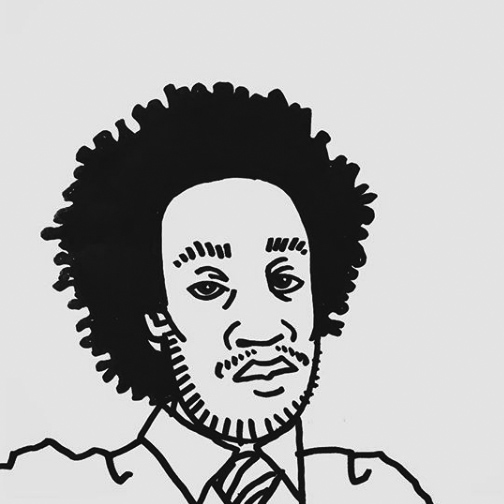

Prince Paul by Jeff Smack
Smack: We’ve alluded to our collaboration and how you’re in Charlottesville. I was thinking back on how we met. We’re both parents, in Richmond, at the Children’s Museum. I Was wearing this ABB Records hoodie and it drew you over to check me out. Do you remember what you said to breach that conversation?
Kayser: I think we were in the painting room of the Short Pump one before they moved it to the mall. I said to my wife, “He’s got an ABB Records sweatshirt” and she was like, “So?” “No, that’s Little Brother and Defari!” If you’re wearing that in 2014, I figured you had to be someone from the label or someone in the industry or just a hardcore fan. You just don’t see an ABB sweatshirt every day. I remember going over and asking if you worked for ABB and you said you used to draw for Elemental. They were the bible for me. I had always tried to write for them and was brushed off. It was cool to hear your Elemental stories and who you had drawn. It was weird to have such a natural connection and how it’s worked out over the years. You don’t go to the Children’s Museum looking for that. I think it was fate. At the time I wanted to do the Words books but didn’t think anyone cared and was really doubting myself. I had no idea about the cover and once I saw the mock-ups from what you sent me, it kicked my butt because it made me realize that if that’s going to be the artwork, it’s going to look amazing so I had to make sure the interviews were on point and the commentary was strong.
Smack: I didn’t think about the art as a motivator but I’m glad that it was. I remember you asking for my story because I couldn’t just be a rap fan. It’s funny because I put that on and it’s my old shirt that’s still in shape but nobody in my day is going to recognize why I love this shirt as much as I do. But it drew conversation and it’s wild that something like that could spark what we’ve done.
Kayser: Did you see it working out that way when we first met?
Smack: No. It’s funny. I didn’t doubt, but I’ve had 150 conversations with people that I might work with. Throughout my career, I’ve stopped taking on many projects. I pick and choose what I can put my heart into. I remember you asking if you could give me a call. I usually told people I wasn’t taking on freelance. I have my job and a family, but I said, “Yeah, give me a call and we’ll see what we can work on.” I have both books in my hand right now and they’re two of the happiest projects that I’ve worked on in years. They came out according to my vision and you liked that and there was not a lot of client process. Just really cool, man.
Kayser: It always felt right. And I know what you mean about so many ideas never coming to fruition.
Smack: So many of the projects you can take 90 percent to the finish line and then it fizzles. And then you learn not to do that anymore. But we left the door open and we’re both happy with the product.
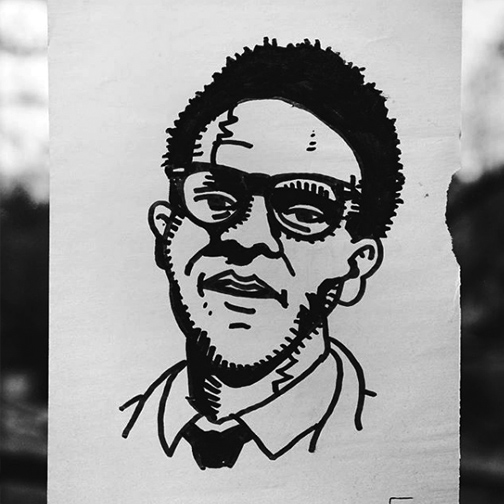

J-Zone by Jeff Smack
Kayser: Now the design is iconic that people can expect. You don’t see a whole lot of illustrations in hip-hop but definitely not that style and what you do to bring it to life. J-Zone really looked like J-Zone and he can’t be an easy person to draw.
Smack: Yeah. I hope he likes it. There’s pressure in that way. You want the person to look at the drawing and say, “Yeah, that’s me.” That’s not an easy thing to undertake. And J-Zone, he’s got a real distinctive face but sometimes he’s got a beard or glasses or he’s wearing a jersey. There’s a lot of things that can throw off a marker drawing. It wasn’t all necessarily for granted. I had to do a lot of studies and I appreciate that you think the likeness carried.
Kayser: Who’s hard to draw in hip-hop?
Smack: If somebody’s got a thing, like they’re always wearing a flatbill hat at a certain angle or they have a certain feature that’s their signature, you can kind of overemphasize that thing. But when people change their style, it gets a little harder. J-Zone was tough. But in my mind, he’s got the headband and the dollar bills and the oversized jersey and the sense of humor. But that’s an old image. I used his updated portraits and I probably drew him thirty times before I felt like I could say, “Yeah, that’s him.” RZA, I drew four times and I was happy with it. Primo, I probably drew him eight or ten times. And Cormega, I would handpick him for a project but he’s got a distinctly face. He’s got different features and different styles in the different photos from different eras. He’s kind of a hard guy to peg.
Kayser: I don’t know if these artists realize how difficult they are to draw.
Smack: Yeah. They’re switching up their haircut or their beard. And I like to draw with a Sharpie. I like to draw with a thick line and simplify the marks. Especially in this look, I don’t get in with a fine point pen and try to get real detailed. I try to stick to a cartoony approach in this project.
Kayser: I think that works well and really brings the artists to life.
Smack: Yeah. I don’t think the art has to be the hardest thing you’ve ever seen. It doesn’t have to be too gritty. Without making obvious reference to graffiti styles, it’s still a black book approach to art. For years, I’ve always been within fifteen feet of a black book and a Micron pen or Sharpie. I think this style is born of that.
*Brian Kayser’s books are available on Amazon and can be found here, and his podcast, WeGoinIN Presents, is available in the Apple Podcast store, Stitcher, and Soundcloud.
*Introduction by Amy David.

